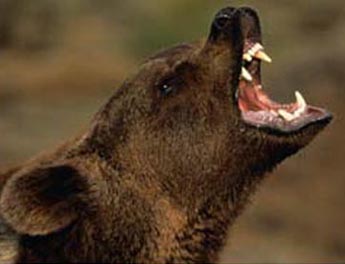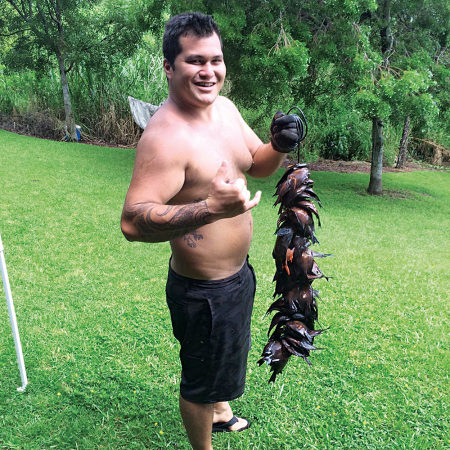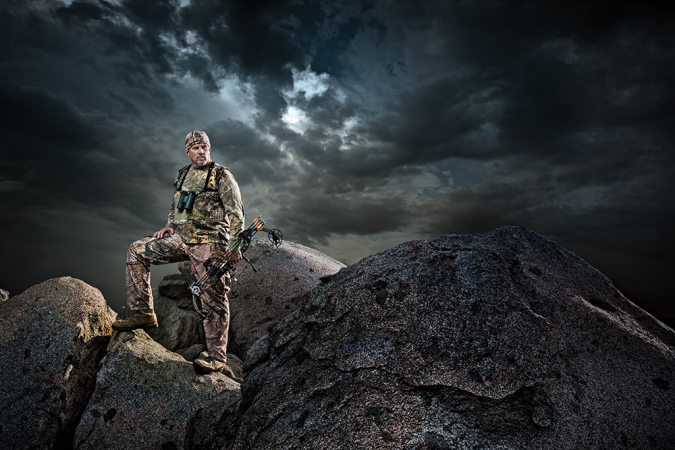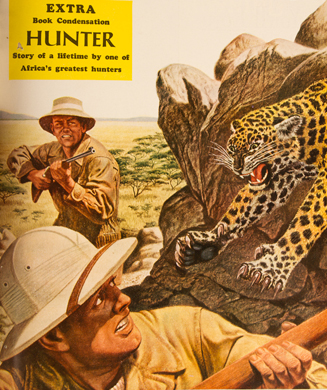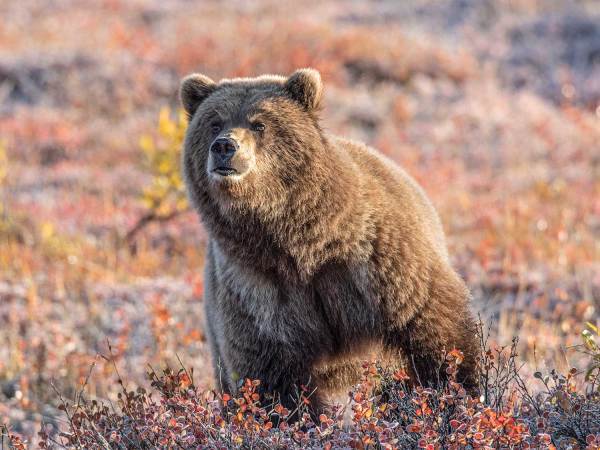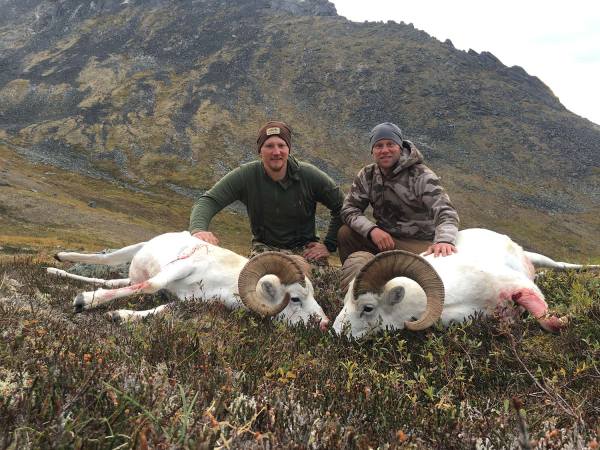John Beiler liked hunting Sitka blacktail deer on Alaska’s Afognak Island. He loved the otter-filled bays, the scenic rock cliffs, the salmon streams and just about all of the island’s many natural wonders. Except one.
Afognak Island has a dark side. Typhoon winds can hammer the coastline mercilessly for days at a time. Huge coastal brown bears roam the dark rain forests and salmon streams. Hunters who are prepared for disasters nevertheless often die or get seriously injured. For John Beiler, misfortune happened to others and not to him. Or so he thought.
At daybreak, Beiler and his hunting buddies Mike and Tom eyed the steep slopes of Mount Paramanof, rising 2,100 feet above their tidewater base camp. It was Thanksgiving week, and they were looking forward to blacktail steaks and mashed potatoes smothered in gravy. The hunters planned a several-hour climb to an alpine meadow where big bucks thrived.
Beiler, who liked to hunt hillsides alone, veered off from his buddies and crossed a marsh near the base of a steep cliff. He was a muscular, big-boned man, well suited to hunting the mountains. Although his rubber boots with tread soles didn’t offer the best traction going uphill, they kept his feet dry as he crossed creeks and swamps.
By late afternoon, a light rain had filled the alpine landscape with the pungent-sweet smell of wet tundra. The approaching storm had caused the deer to hole up in thickets, and the dark outline of the beach below would take an hour to reach. Beiler quickened his pace so he could rendezvous with his friends before dark.
The hillside’s grass and decaying broadleaf vegetation were as slick as greased ice. Leaning farther back for balance on the steep incline, he felt his right foot slide on an ice patch and shoot out from under him. He hit the ground with a jarring slam.
Beiler paused for a few moments to regain his breath. He shook his head in self-admonition and tried to stand. Something wasn’t right.
The sole of his left boot faced up, having slipped off in the fall. No big deal; he grabbed the boot top to pull it back on. His fingers slowed, then froze.
His foot was still inside the boot.
The horror of the moment paralyzed and bewildered him. He dug in his right heel and sat upright. There was no pain, yet the fall had snapped his leg in two places.
Beiler used his rifle barrel to straighten out his foot. The leg exploded in pain, stealing his breath and driving his head back in agony. He gritted his teeth and sucked air deep into his gut.
Long minutes passed before the pain subsided. The hill’s steep angle made it impossible to move, so he took inventory of the situation.
His survival gear consisted of a penlight, waterproof matches, three tea bags, a can of Sterno, aluminum foil, a candy bar, jerky, a knife and 10 rounds of ammo. He was wearing a cap, gloves, a hoodless rubber-coated rain jacket and the kind of waterproof pants used by commercial fishermen. Underneath he wore flannel-lined pants, cotton long johns and a wool shirt.
Beiler decided to tough it out and let his friends find him. Being in the open, he would have a clear shot at any brown bears that viewed him as an easy meal.
The wool clothing soaked up drizzle like a dry sponge. Beiler sliced off his yellow rain pants, first down one leg, then the other. He pulled the fabric over his head and curled up against the storm.
Though he tried to hold his position, gravity kept biting away at his foothold, eroding the earthy stop under his right heel. He watched his injured leg twist grotesquely, then fold up like the edge of a pancake turned before its time. With teeth clenched tight, he eased uphill to straighten his leg. The pain swelled within him.
Using his fingers like claw hammers, he gouged clumps of mud and grass from the partially frozen ground. He slid into the dip and used the roots there to create a mud and grass splint around his leg. Then he braced himself and fired three shots. The recoil set off more spasms of excruciating pain. Far down on the beach, a three-shot reply sailed past him and echoed off the rocky countenance.
They heard him!
Thinking Beiler had bagged a deer, Mike and Tom returned to camp to start supper and await his return.
Beiler was realistic. Paramanof’s forested mountainside was now too dark and dangerous for his friends to begin looking for him. He knew he was on his own until morning.
In camp, Tom and Mike had not been idle. Their spruce bonfire roared and crackled, a beacon for Beiler to follow. They shot their hunting rifles repeatedly.
Finally, they heard a single shot and knew he was alive.
From the mountain, Beiler watched the massive storm churn Shelikof Strait into a whitecapped frenzy. He saw a commercial shrimp boat take refuge in the bay below. Soon after, a small runabout cut a wake to his hunting camp. No doubt his friends would ask the captain for help.
In the hours before midnight, steady rain and cold worked their hypothermic poison, slowly numbing Beiler’s legs and back. He was losing consciousness.
Beiler believed that if he fell asleep he’d never wake up. He placed a tea bag in his mouth, steeping it in whatever saliva he could muster. The tea gave him a slight buzz that kept him awake. He sucked on the bags until the paper dissolved. Then he chewed on leaves and twigs. On the brushy alpine tundra, there was no wood.
The cold rain trickled through his makeshift hood, inching through his underwear. He lit the Sterno and placed the hot metal can on his chest. Once warmed, he allowed the 50-knot gusts to douse the flame for a while.
He flashed his penlight to signal his location to any observers. The blackness failed to blink a reply. Around midnight, the last of the Sterno flickered out. His shivering became so intense that his gun barrel vibrated.
He contorted his mouth to catch rain. His clothes were soaked, yet he craved water. The wool gloves sopped up the puddles around him. With head back, he wrung every drop of the precious liquid into his mouth. A blast of rain pelted his face, and he prayed to survive the night.
The storm howled its opposition to the breaking dawn as Shelikof frothed in a tempest of whitecaps. The tops of hundred-year-old spruce trees whipped violently. Beiler had survived what seemed an eternity in this mountainside purgatory, and he was desperate for deliverance.
Fifty yards away, a brush line snaked its way along the base of a shelf, taunting him with its promise of wood and fire. But the distance was just too great.
Survival became difficult. Hypothermia was a wrecking ball that continuously chipped away at his instinct for self-preservation, luring him into a world of neither pain nor cold. Beiler found an inner strength and calm thinking about his brothers, sisters and family. He pledged to give up his bad habits. And finally, he made his peace with his Maker, just in case.
Beiler snapped to full alert, fearful he had fallen asleep. Revitalized by the burst of adrenaline, he decided he was going to live. He wouldn’t give up, no matter what.
The cold had left his leg and back muscles knotted up and useless. He pushed himself up with his arms, raising and balancing his torso on his numb, unbroken leg. Slowly he pushed himself upward and inched his broken leg forward. The world spun and he hit the ground hard. He struggled to breathe as he slid and rolled headfirst for 20 feet before wedging into a grassy tussock.
Beiler’s left leg had the rigidity of a wet towel and stuck out 90 degrees from his body. He gagged at the sight and would have vomited if he had had any food in his stomach.
Dragging his rifle, Beiler crawled to some buck brush 40 yards distant. His foot flopped and rotated over the hummocks as if he was swiveled at the knee. The pain stabbed him relentlessly, driving him crazy. But he kept crawling.
After reaching the brush, he reset his leg and took a breather. He cut pieces of alder and painstakingly arranged and lashed them to his leg with strips of rain pant.
Meanwhile, at Mike and Tom’s request, the shrimp boat skipper radioed the Coast Guard that a hunter had spent a night on the mountain and was possibly in trouble. At the same time, the friends grabbed sleeping bags, food and water and fired signal shots on the hillside below him.
Beiler knew they’d never see him in the brush. He tried to shout, but his throat was parched from thirst. Their rifle shots grew louder. He fired his last round, knowing that his rescue was now close at hand.
He tried to stand and again fell onto his back. Dazed, he looked up and witnessed a bizarre sight. Several ravens hovered over him on gusts of wind, performing an aerial circus of squawks and acrobatics. Mike and Tom saw the ravens and turned toward the commotion.
Beiler could hear shouts far off in the brush. He struggled to rise but couldn’t. Failure and defeat shackled him to the ground. He was spent. He gritted his teeth and slowly rose to his one good knee. If they passed him in the brush, it would be over.
With the gun as a crutch in his left hand, and the remnants of his yellow rain pants in his right, Beiler wobbled upright, teetered on one leg and waved his pants and gun at the disappearing rescuers. His broken, cramped and fatigued limbs were unable to hold him, and he crumpled into a clump of broken flesh. He had given it everything he had.
It was enough. Mike and Tom saw him and busted through the brush to his side. Beiler’s adrenaline surged at the sight of his rescuers, but he was in bad shape. Mike pulled out a Snickers bar, a fried-egg sandwich and a cold Coke. Beiler wolfed down the food. Ever so slowly, his limbs started to tingle with feeling.
They dressed him in a spare rain suit and roped both legs together from ankle to thigh. Even his head was lashed forward to keep his neck from catching a log and snapping. They numbed him with pain medication and started their descent.
Once in the heavy timber and out of the wind, Mike stayed with Beiler and got a fire going while Tom descended to base camp for more supplies and to summon help.
The hot spruce fire pierced Beiler’s stupor and drew him like a moth. The heat blistered the back of his rain jacket. Mike kept rolling Beiler away from the fire. Incoherent and hypothermic, Beiler didn’t care if he was on fire. He needed heat desperately.
Mike piled more green sticks on the fire, and soon they could hear the rescue helicopter hovering overhead. Mike dragged his friend into the open.
Gusts of wind howled across the mountaintop, making the copter flare repeatedly. The copter dangled the rescue basket in front of Mike. He caught it single-handedly and strapped Beiler in before finally patting him on the chest.
“You’re okay, John,” Mike shouted over the rotor wash.
“Tie me in tight, little buddy,” Beiler replied, and gave him a thumbs up.
At Kodiak hospital, the doctor cut off the makeshift splint. Beiler’s foot and leg flopped to the side. They sheared off his wet, soiled clothes, set his leg and treated him for hypothermia and dehydration.
Beiler spent Thanksgiving in the hospital, having cafeteria turkey instead of his blacktail venison. That weekend, with his leg in a full cast, he found himself with nothing to wear for his flight home to Fairbanks. A nurse brought him some clothes from a man who had recently died.
John contemplated the many events that saved his life. A storm forced a fishing boat to seek shelter near their camp. The skipper had a radio that he used to summon the Coast Guard for assistance. The ravens helped lead his buddies to his location. Had these things not happened, his clothes might have been the ones offered to someone else.
He hobbled upright on crutches out of the Kodiak hospital, a grateful man in borrowed clothes, both having received a second chance at life.

